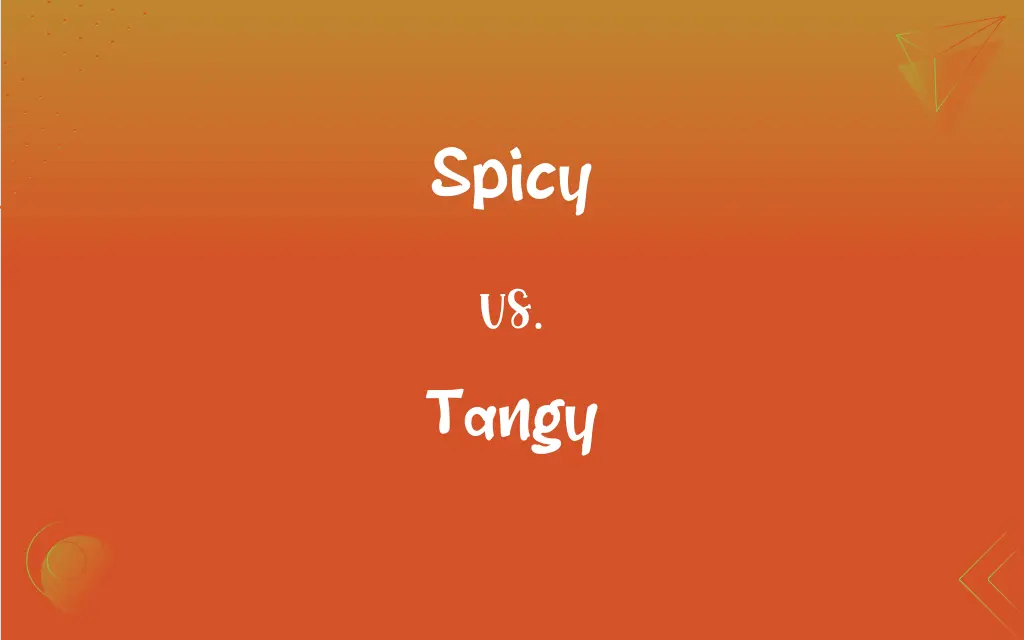Spicy vs. Tangy: What's the Difference?
Edited by Aimie Carlson || By Harlon Moss || Updated on November 6, 2023
Spicy refers to a strong, pungent flavor from hot substances like chili peppers; tangy denotes a sharp, often citrusy taste that is pleasantly piquant.

Key Differences
Spicy flavors are characterized by the presence of capsaicin, found in chili peppers, which triggers a burning sensation on the taste buds. Tangy flavors, on the other hand, are sharp and biting, often derived from acidic ingredients such as lemon or vinegar. While spicy foods stimulate heat receptors, tangy foods activate the taste receptors for acidity and sourness.
In the culinary world, spicy is often associated with cuisines known for their heat, such as Indian or Thai food, which include ingredients like cayenne or jalapeños. Tangy flavors are central to dishes that require a burst of acidity for balance, like a Greek salad dressed with lemon juice. Both spicy and tangy tastes add depth and interest to dishes, but achieve this through different sensory experiences.
The experience of eating spicy food can lead to a warming sensation that some find exhilarating, while tangy flavors can cause a mouthwatering effect due to their acidity. Spicy foods can also cause a person to sweat, a phenomenon known as gustatory sweating, whereas tangy foods can lead to a puckering sensation. The appeal of spicy and tangy flavors varies widely among individuals, reflecting a diversity of palates.
Spicy flavors are often moderated with dairy products, which contain casein that helps dissipate capsaicin, the compound responsible for the burning sensation. In contrast, tangy flavors are often balanced with sweetness or saltiness, rather than being neutralized. While dairy can soothe the heat of spicy foods, sweet or salty elements can tame the sharpness of tangy foods without diminishing their zest.
The threshold for what is considered spicy can vary greatly from person to person, influenced by cultural background and individual tolerance. Tangy flavors, while also subjective, tend to have a more universally recognizable profile, often linked to the freshness and zing of citrus or fermented foods. Spicy and tangy elements are both used to enhance the flavor profile of food, but they cater to different aspects of our taste spectrum.
ADVERTISEMENT
Comparison Chart
Primary Flavor
Heat from capsaicin.
Sharpness from acidity.
Common Sources
Chili peppers, black pepper.
Citrus fruits, vinegar.
Sensation
Burning and warmth.
Puckering and zesty.
Balancing Agents
Dairy products.
Sweet or salty components.
Culinary Use
To add heat and intensity.
To add brightness and freshness.
ADVERTISEMENT
Spicy and Tangy Definitions
Spicy
Flavored with or containing strong spices and seasonings that produce a burning sensation.
The spicy salsa was a hit at the party.
Tangy
Describing a flavor that strikes a balance between sweetness and acidity, often found in fruits.
The tangy orange slices were the perfect after-dinner palate cleanser.
Spicy
Excitingly piquant or zesty, often referring to ethnic cuisines known for their heat.
They enjoyed a spicy Thai meal that was full of flavor.
Tangy
Tasting sour or acidic, often in a way that is refreshing or pleasantly sharp.
She sipped the tangy lemonade on a hot summer day.
Spicy
Indicative of or containing spices that can induce a sensation of heat on the palate.
He added too much cayenne pepper, making the dish overly spicy.
Tangy
Having a sharp taste or flavor immediately noticeable to the tongue.
The tangy vinaigrette added a bright note to the salad.
Spicy
Having a strong, pungent flavor that is often hot and peppery.
She ordered a spicy curry that made her eyes water.
Tangy
A taste sensation that is often associated with certain dairy products like yogurt or sour cream.
The tangy yogurt was homemade and drizzled with honey.
Spicy
Descriptive of food that has a strong flavor profile that includes elements of heat and pungency.
The spicy chicken wings were so hot that he needed a glass of milk.
Tangy
Characterizing food that has a piquant flavor, often derived from fermentation or citrus.
He loved the tangy taste of the pickled vegetables.
Spicy
Having the flavor, aroma, or quality of spice.
Tangy
A distinctively sharp taste, flavor, or odor, as that of orange juice.
Spicy
Piquant; zesty
A spicy tomato sauce.
Tangy
A distinctive quality
"Underneath it all was the tang of genuine adventure" (Jan Clausen).
FAQs
What makes food spicy?
Capsaicin in chili peppers and other hot spices creates a spicy flavor.
Is lemon juice considered spicy or tangy?
Lemon juice is tangy due to its acidic nature.
Can food be both spicy and tangy?
Yes, some dishes incorporate both heat and acidity for a complex flavor.
What does tangy mean in food?
Tangy refers to a sharp, often acidic flavor that is typically refreshing.
Can tangy flavors affect digestion?
Yes, the acidity in tangy foods can stimulate digestive processes.
Can children tolerate spicy foods?
Tolerance varies; it's often an acquired taste developed over time.
Do all cultures enjoy spicy food?
Enjoyment of spicy food varies by individual and cultural preferences.
Does tangy food pair well with wine?
Yes, tangy foods can complement the acidity in certain wines.
How do you reduce the spiciness of a dish?
Adding dairy, sugar, or acid can help temper the spiciness.
What types of food are typically tangy?
Citrus fruits, fermented foods, and dishes with vinegar are often tangy.
Is tanginess a desirable quality in desserts?
Yes, it can provide a refreshing contrast to sweetness.
How do you measure the spiciness of food?
The Scoville scale measures the heat level of spicy foods.
Can spicy food harm your taste buds?
No, but it can temporarily affect your sensitivity to other flavors.
Are spicy foods always hot in temperature?
No, spicy refers to flavor, not the temperature of the food.
Is spiciness a taste or a sensation?
Spiciness is more of a sensation that affects pain receptors, not a basic taste.
Is there a health benefit to eating spicy food?
Some studies suggest spicy food can boost metabolism and heart health.
Are there sweet tangy flavors?
Yes, some fruits like oranges have a sweet yet tangy flavor.
Can spices that are not hot still be considered spicy?
Yes, 'spicy' can also refer to the presence of aromatic spices.
Is there an antidote to extreme spiciness?
Milk or other dairy products can help neutralize the burn.
Do tangy foods have vitamin C?
Many tangy foods, especially citrus fruits, are high in vitamin C.
About Author
Written by
Harlon MossHarlon is a seasoned quality moderator and accomplished content writer for Difference Wiki. An alumnus of the prestigious University of California, he earned his degree in Computer Science. Leveraging his academic background, Harlon brings a meticulous and informed perspective to his work, ensuring content accuracy and excellence.
Edited by
Aimie CarlsonAimie Carlson, holding a master's degree in English literature, is a fervent English language enthusiast. She lends her writing talents to Difference Wiki, a prominent website that specializes in comparisons, offering readers insightful analyses that both captivate and inform.































































